Diversity, harmonious coexistence seen as crucial to region's future
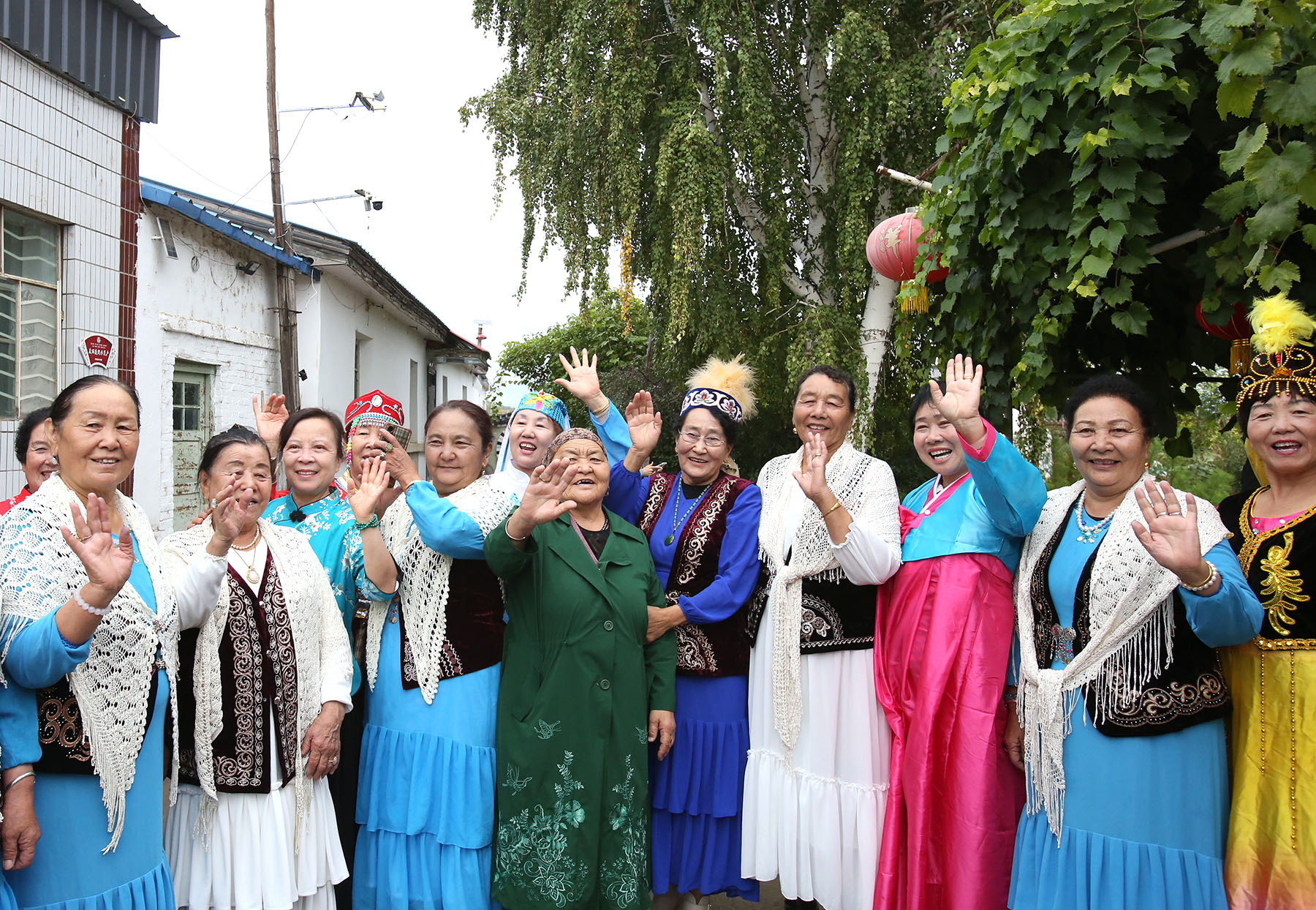
Li Limin greeted Azgul Abula with a peck on the cheek when the two women bumped into each other on a sunny afternoon in a residential community garden in Urumqi.
The intimate exchange, at Guyuanxiang community in the capital of the Xinjiang Uygur autonomous region, is a Uygur ethnic group custom when close female friends meet.
"Although I am from the Hui ethnic group, it has become a subconscious thing to do after living for over 40 years in a neighborhood where people from ethnic minority groups account for more than 95 percent of the residents," Li said.
READ MORE: Xi: Pool efforts to build 'beautiful Xinjiang'
The residents know and respect the traditions of people from different ethnic groups including Han, Hui, Uygur, Kazak and Tatar. At the same time, they care for each other like members of one big family, 70-year-old Li said.
Forging ethnic unity may seem like a big challenge, but in Xinjiang — which has been a multiethnic region since ancient times — it starts with little things such as a peck on the cheek, lending a helping hand when someone is in need, or celebrating festivals together.
"Such actions are never deliberate, but something happens every day and comes naturally from people's hearts," Azgul, 49, said. "A simple greeting like that means a lot."
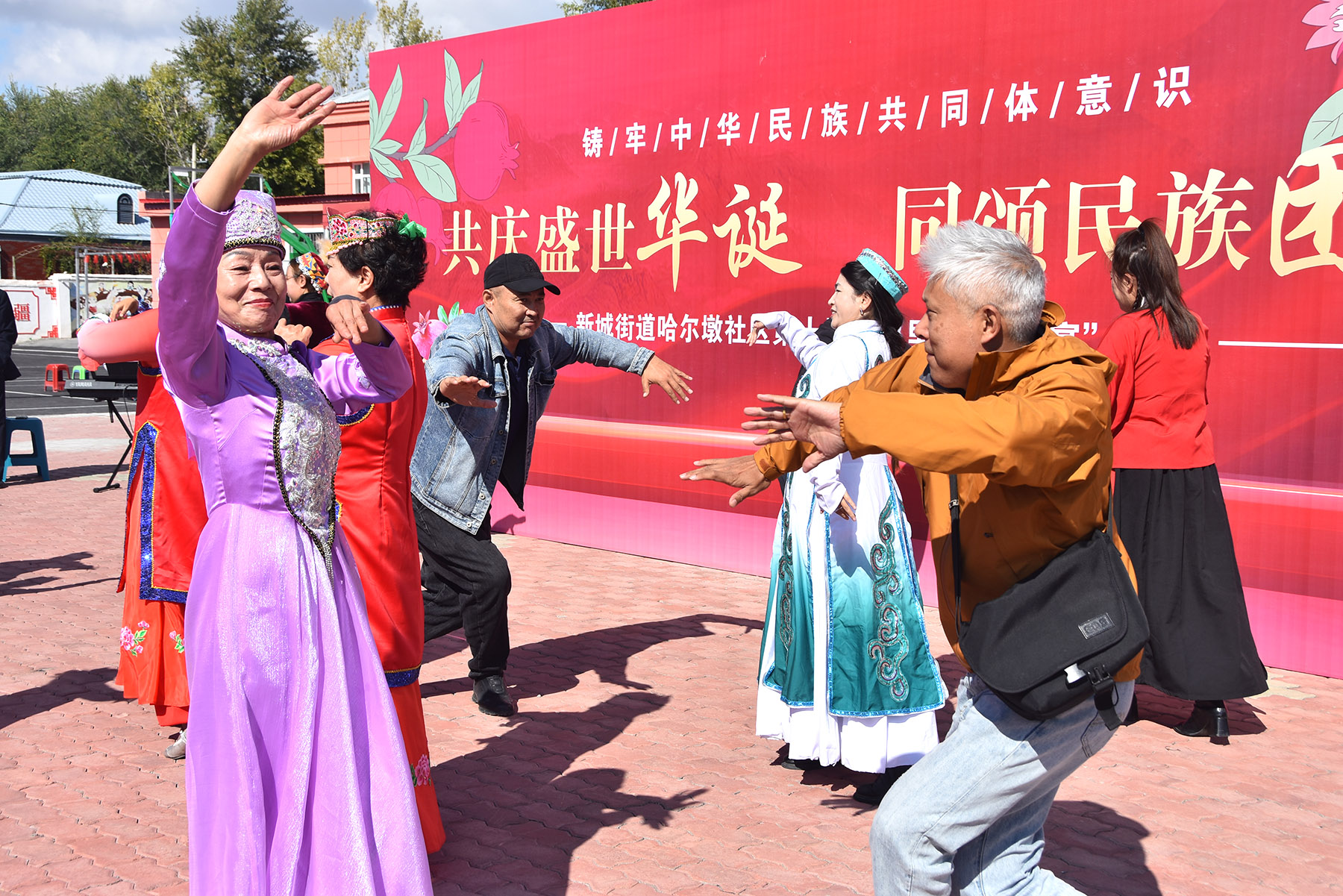
Members of 'big family'
Xinjiang people have a strong understanding of the severe consequences when ethnic unity is sabotaged, which in the past has caused social instability and even led to violence. The lives of people from all ethnic groups are severely disturbed and affected when such incidents happen, Li said.
"We have seen what Xinjiang and Xinjiang people can achieve when the relationships between the region's diverse, interwoven ethnic groups become harmonious, especially over the past decade," she said. "So, more than ever, people in Xinjiang cherish ethnic unity, especially the younger generations."
When he visited the community in July 2022, President Xi Jinping said ethnic unity is the lifeline of all ethnic groups in the country, and that all ethnic groups in Xinjiang are inseparable members of the big family of the Chinese nation.
Xi, who is also general secretary of the Communist Party of China Central Committee and chairman of the Central Military Commission, also called for cherishing the stability and unity that have already been achieved.
Li said: "Xinjiang's stability doesn't only matter to the local people, but is also key to the development of China. And it can only be achieved when people from all ethnic groups understand that despite their different ethnicities, they are all equal members of the Chinese nation with a shared future."
Shalkjan Yiming, from northern Xinjiang's Tacheng city, said ethnic unity is the best defense against secessionists who have in the past harmed Xinjiang residents' lives and damaged national unity.
"The last thing the secessionists want to see is that people from different ethnic groups are united, because they know how powerful it can be," the 79-year-old from the Uygur ethnic group said in the small courtyard of his home in the Hardun residential community. In the city, the courtyard is well-known for the raising of the Chinese national flag during every major festival.
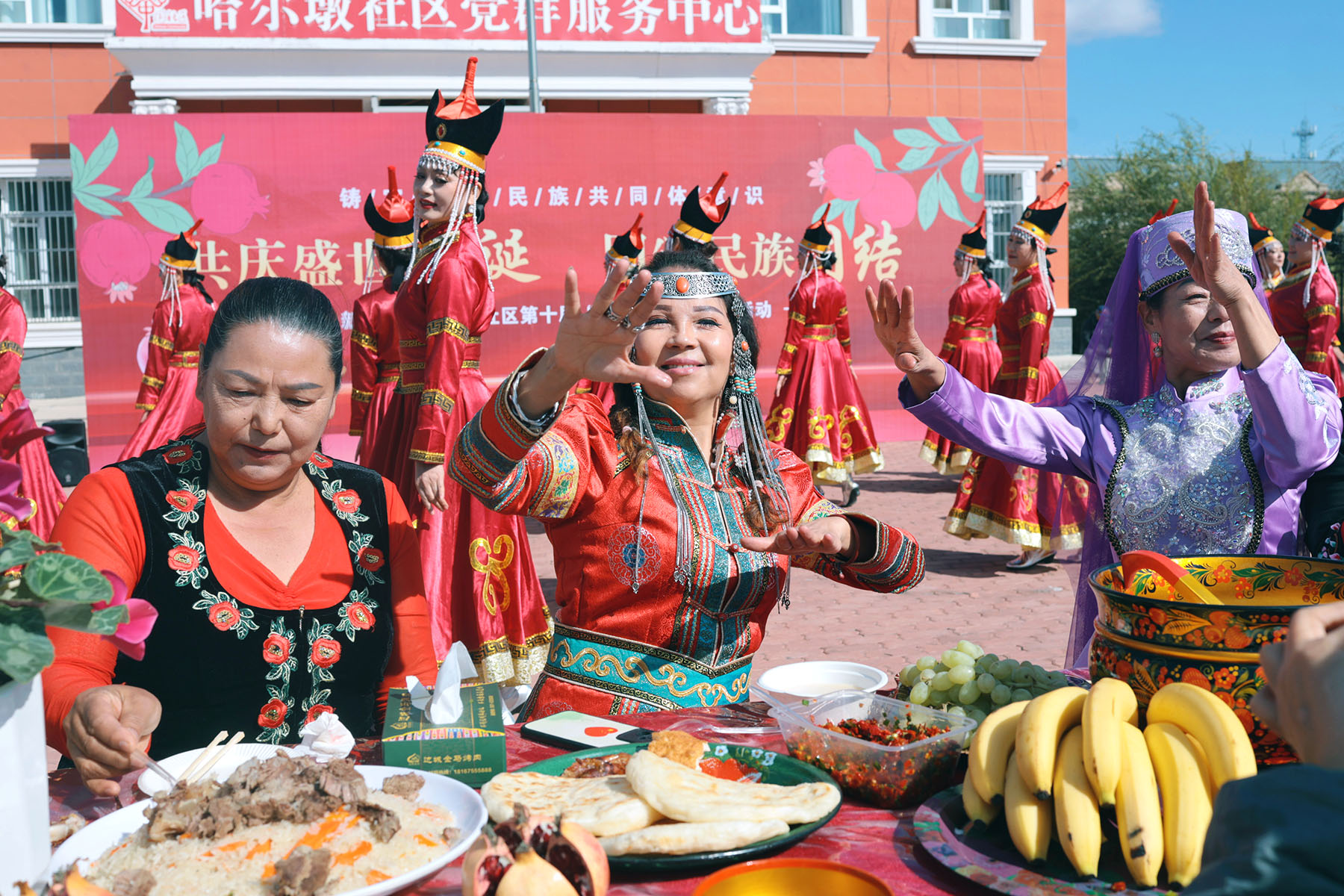
The first flag-raising ceremony was on Oct 1, 2009, the 60th anniversary of the founding of the People's Republic of China. Shalkjan felt there was a great need for people to gather under the national flag and "plant the seeds of love" for the country in the hearts of the young generation.
"Besides communicating with each other during my flag-raising ceremony, now people from the 14 ethnic groups in the Hardun community often have meals together and taste the signature dishes of different ethnic groups," he added.
"The music of all ethnic groups can be played on the accordion, which is the most popular instrument in Tacheng. We are just one big family with no distinction between one ethnic group and another," he said.
The Hardun community is home to 3,821 residents living in 1,510 households, and people from ethnic minority groups account for 66.69 percent of the total population. What's more, the number of mixed families formed by different ethnic groups has reached 274.
Bahargul, Party secretary of the community, said integration had happened gradually over time.
"Forging ethnic unity always starts with little, but heartwarming things," said Bahargul, who asked to be identified by one name. "For example, residents have the habit of leaving the front gates of their houses open so neighbors will feel that they are welcome to visit at any time. It goes beyond people's need for a sense of security when they do this."
Khalitan Ylahon is one of those residents who leaves her gate open, and her house is known as the "rose garden" for the colorful flowers that crowd her front yard.
Khalitan, from the Uygur ethnic group, learned how to cook a wide variety dishes from her relatives, who are from diverse ethnic backgrounds.
Her husband is Uzbek, her younger sister married a Kazak, her older sister married a Tatar, and her son-in-law's father is Russian. From them, she learned how to make Uzbek stewed lamb with fruits and vegetables, Kazak horse and lamb noodle soups, and Tatar cakes.
"I am very proud of my family and the community," Khalitan said.
"Having lived together for so long, we have come to understand each other's languages, grown accustomed to each other's cuisines, and moved in harmony to the rhythm of each other's music. It feels like we are having parties all the time because we celebrate the festivals of different ethnic groups together. I believe it's a life that can make many people jealous," she said.
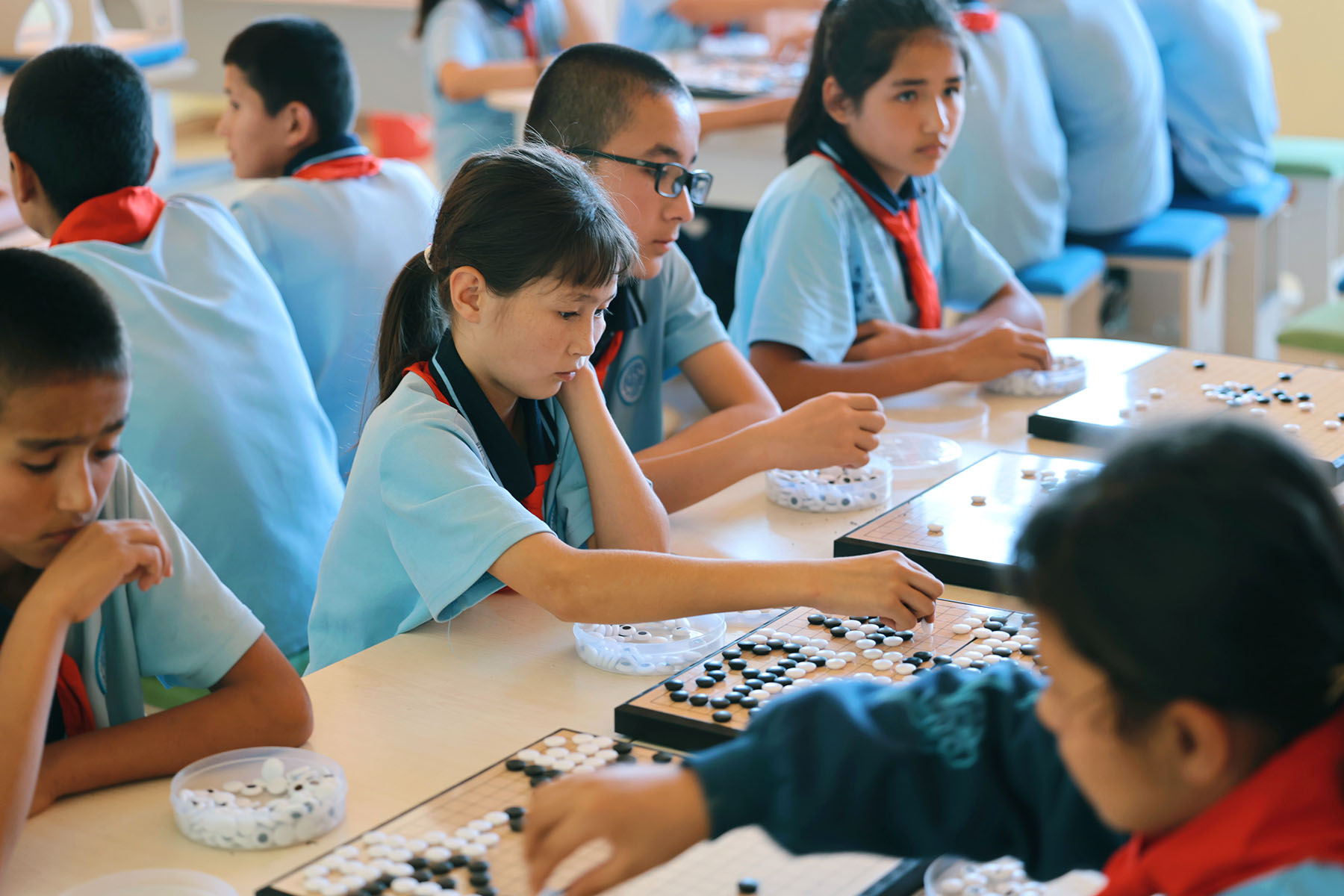
Direct beneficiaries
In Xinjiang, people have tasted the fruit of ethnic unity and become its direct beneficiaries. They are determined to be more united in the future, which is also crucial for China's development, said Cai Lei from the Xibe ethnic group.
Cai owns a guesthouse on the outskirts of Urumqi, which is a popular wedding venue. "We have hosted weddings for couples from the Kazak, Hui and Uygur ethnic groups, which follow different customs and traditions," he said.
Cai's employees are also from different ethnic backgrounds.
"I hope they can share their unique customs and traditions with the guests and turn the guesthouse into a place to showcase the diverse cultures in Xinjiang. Meanwhile, we are also one big family."
The social stability brought by enhanced ethnic unity in recent years has made people feel greatly encouraged and confident about Xinjiang's future, Cai said. That's why many Xinjiang people who went to other parts of China for work or business have come back after seeing the great potential of their home, he added.
"It's clear that ethnic solidarity has become a critical guarantee for Xinjiang's social progress and prosperity," he said.
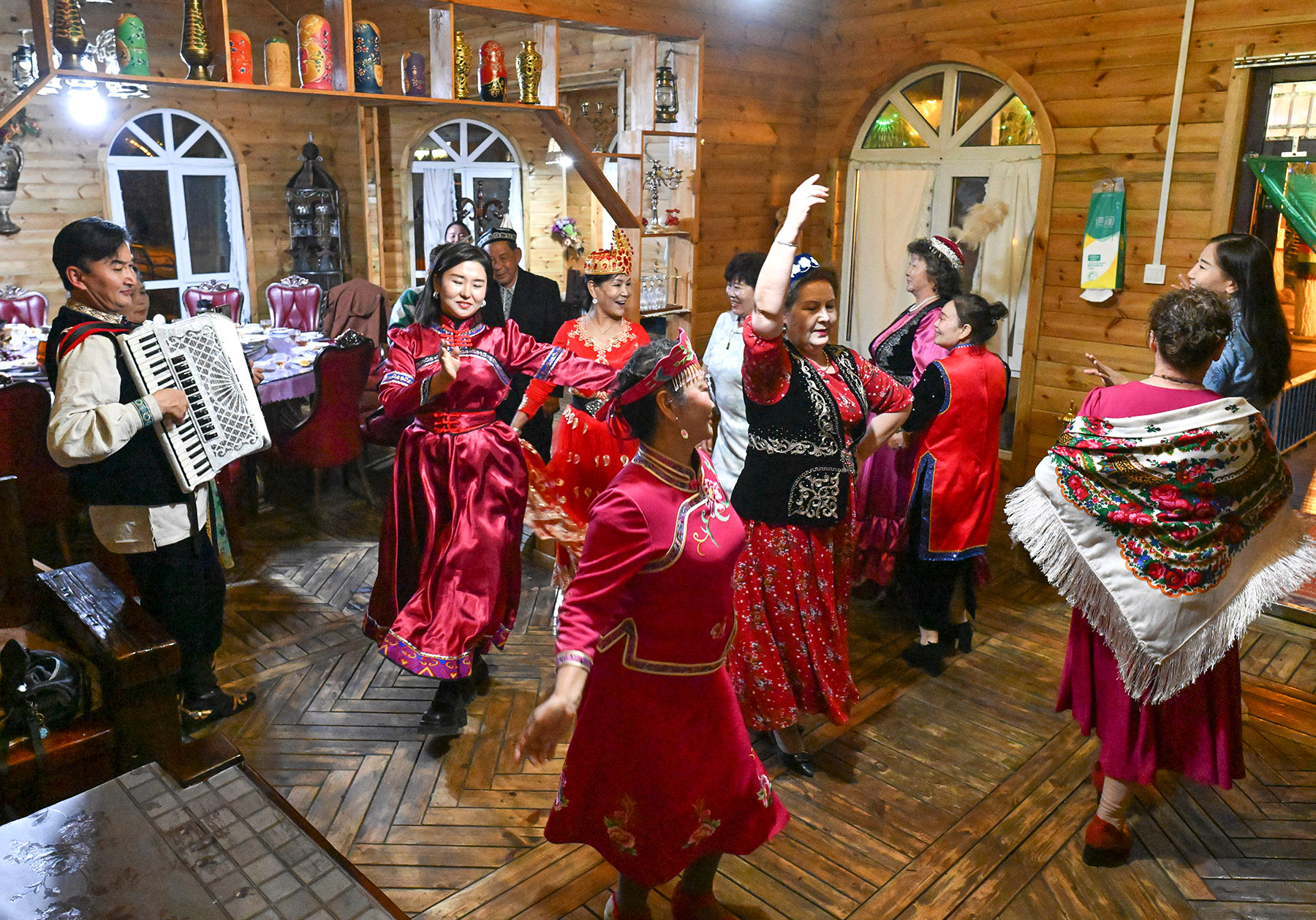
Building together
Xinjiang is now in the best period of development in its history, featuring unprecedented economic and social progress, marked improvements in people's well-being and a stronger sense of gain, happiness and security among residents, according to a white paper issued on Friday.
Titled "Communist Party of China Guidelines for Governing Xinjiang in the New Era: Practice and Achievements", the white paper was unveiled at a news conference held by the State Council Information Office in Beijing.
"People have all benefited from such development even in remote areas of the region," said Cai.
As an example, he pointed from the guesthouse balcony to a nearby highway under construction that runs through the mountains. The highway is part of the Urumqi-Yuli Expressway, which is set to slash travel time to just three hours by crossing the Tianshan Mountains. It will feature the world's longest expressway tunnel.
"After becoming operational, the mountains will no longer divide northern and southern Xinjiang. It will further improve the lives of so many people," Cai said.
He added that more than ever, Xinjiang people have reached the consensus that they are members of the Chinese nation. That's why many children will say they belong to the Chinese nation first when asked about their ethnicity, he said. "We often see tourists posting such videos on social media. And you can tell that the children feel proud of that from the bottom of their hearts," Cai said.
Ouyincaolimeng, from the Mongolian ethnic group, said all ethnic groups in Xinjiang are united in support of diversity.
ALSO READ: Xinjiang gets big boost from pairing strategy
An increasing number of people have shown interest in preserving the cultures and traditions of different ethnic groups, which have been supported by governments at all levels. Many young people do an outstanding job of promoting ethnic cultures via social media, said Ouyincaolimeng, an intangible cultural heritage representative inheritor of Mongolian traditional costumes.
"We are proud of being both a member of the Chinese nation and our ethnic group. Take me as an example, I am proud to be Chinese first. And when I travel outside the region, I am proud to say that I am from Xinjiang," said Ouyincaolimeng, who goes by one name.
"When asked about my ethnicity, I will proudly tell them about the rich history of the people from the Mongolian ethnic group in the region," said the owner of a traditional Mongolian costumes showroom at the Xinjiang International Grand Bazaar — one of the most popular spots for tourists in Urumqi.
Li from the Guyuanxiang community, which is next to the Grand Bazaar, said all the residents want to see more people visit Xinjiang, especially tourists from overseas.
"We know that there are many rumors spread about Xinjiang, but they can all be easily cleared up by a visit to the region. More importantly, they (the visitors) can see how people from different ethnic groups live harmoniously together; and our life and the region's future will only get better," Li said.
Contact the writer at cuijia@chinadaily.com.cn


